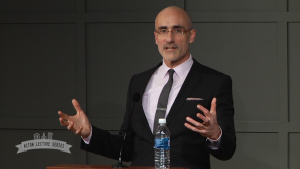


American Enterprise Institute President Arthur C. Brooks joined us here at the Acton Institute on Monday evening as part of the Acton Lecture Series, and as usual he delivered a great and optimistic message, even in the midst of this time of deep divisions in the United States.
It’s impossible to avoid the fact that America is more deeply divided politically today than it has been in decades, and the question is whether or not the current state of affairs represent a “new normal” for the country. As politicians and pundits struggleto understand this populist moment, Brooks draws on history and social science to explain these unusual times – and offers a set of strategies, from national policy to personal advice, that we can use to rebuild prosperity and reunite the country. We’re pleased to share his message via the video player below.









